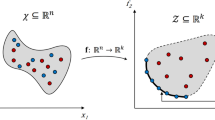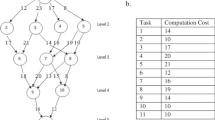Abstract
This paper considers multiprocessor task scheduling in a multistage hybrid flow-shop environment. The objective is to minimize the make-span, that is, the completion time of all the tasks in the last stage. This problem is of practical interest in the textile and process industries. A genetic algorithm (GA) is developed to solve the problem. The GA is tested against a lower bound from the literature as well as against heuristic rules on a test bed comprising 400 problems with up to 100 jobs, 10 stages, and with up to five processors on each stage. For small problems, solutions found by the GA are compared to optimal solutions, which are obtained by total enumeration. For larger problems, optimum solutions are estimated by a statistical prediction technique. Computational results show that the GA is both effective and efficient for the current problem. Test problems are provided in a web site at www.benchmark.ibu.edu.tr/mpt-hfsp.



Similar content being viewed by others
References
Gupta JND (1988). Two-stage hybrid flow-shop scheduling problem. J Opl Res Soc 39: 359–364.
Hoogeveen JA, Lenstra JK and Veltman B (1996). Pre-emptive scheduling in a two-stage multiprocessor flow-shop is NP-hard. Eur J Opl Res 89: 172–175.
Sundararaghavan PS, Kunnathur AS and Viswanathan I (1997). Minimizing make-span in parallel flow-shops. J Opl Res Soc 48: 834–842.
Haouari M and M'Hallah R (1997). Heuristic algorithms for the two-stage hybrid flow-shop problem. Opns Res Lett 21: 43–53.
Riane F, Artiba A and Elmaghraby SE (1998). A hybrid three-stage flow-shop problem: Efficient heuristics to minimize make-span. Eur J Opl Res 109: 321–329.
Dessouky MM, Dessouky MI and Verma SK (1998). Flow-shop scheduling with identical jobs and uniform parallel machines. Eur J Opl Res 109: 620–631.
Gupta JND et al (2002). Heuristics for hybrid flow shops with controllable processing times and assignable due dates. Comput Opns Res 29: 1417–1439.
Riane F, Artiba A and Iassinovski S (2001). An integrated production planning and scheduling system for hybrid flowshop organizations. Int J Production Econom 74: 33–48.
Portmann M-C, Vignier A, Dardilhac D and Dezalay D (1998). Branch and bound crossed with GA to solve hybrid flow-shops. Eur J Opal Res 107: 389–400.
Moursli O and Pochet Y (2000). A branch-and-bound algorithm for the hybrid flow-shop. Int J Production Econom 64: 113–125.
Negenman EG (2001). Local search algorithms for the multiprocessor flow-shop scheduling problem. Eur J Opl Res 128: 147–158.
Grangeon N, Tanguy A and Tchernev N (1999). Generic simulation model for hybrid flow-shop. Comput Ind Eng 37: 207–210.
Linn R and Zhang W (1999). Hybrid flow shop scheduling: a survey. Comput Ind Eng 37: 57–61.
Riane F and Artiba A (1999). Scheduling multistage flow-shop problem: a brief review. In: Proceedings of the International Conference on Industrial Engineering and Production Management, Glasgow, ISBN 2-930294-02-7, Volume 2. Facultés Universitaires Catholiques de Mons, Mons, Belgium, pp 323–335.
Botta-Genoulaz V (2000). Hybrid flow shop scheduling with precedence constraints and time lags to minimize maximum lateness. Int J Production Econom 64: 101–111.
Vignier A, Billaut J-C and Proust C (1996). Minimizing maximum tardiness in some two-stage hybrid flow-shops. In: Proceedings of the 5th International Workshop on Project Management and Scheduling. Scientific Publishers OWN PAN, Poznan, Poland, pp 253–257.
Gupta JND and Tunc EA (1998). Minimizing tardy jobs in a two-stage hybrid flow-shop. Int J Production Res 36: 2397–2417.
Brucker P and Kraemer A (1996). Polynomial algorithms for resource-constrained and multi-processor task scheduling problems. Eur J Opl Res 90: 214–226.
Drozdowski M (1996). Scheduling multiprocessor tasks — an overview. Eur J Opl Res 94: 215–230.
Lee C-Y, Lei L and Pinedo M (1997). Current trends in deterministic scheduling. Ann Opns Res 70: 1–41.
Chen J and Chung-Yee L (1999). General multiprocessor task scheduling. Naval Res Logistics 46: 57–74.
Amoura AK, Bampis E, Manoussakis Y and Tuza Z (1999). A comparison of heuristics for scheduling multiprocessor tasks on three dedicated processors. Parallel Comput 25: 49–61.
Cai X, Lee C-Y and Li C-L (1998). Minimizing total flow time in multiprocessor task systems with pre-specified processor allocations. Naval Res Logistics 45: 231–242.
Bianco L, Blazewicz J, Dell'Olmo P and Drozdowski M (1997). Linear algorithms for pre-emptive scheduling of multiprocessor tasks subject to minimal lateness. Discrete Appl Math 72: 25–46.
Drozdowski M and Dell'Olmo P (2000). Scheduling multiprocessor tasks for mean flow time criterion. Comput Opns Res 27: 571–585.
Cai X, Wong T-L and Lee C-Y (2000). Multiprocessor task scheduling to minimize the maximum tardiness and the total completion time. IEEE Trans Robotics Automat 16: 824–830.
Correa RC, Ferreira A and Rebreyend P (1999). Scheduling multiprocessor tasks with genetic algorithms. IEEE Trans Parallel Distributed Syst 10: 825–837.
Oğuz C and Ercan MF (1997). Scheduling multiprocessor tasks in a two-stage flow-shop environment. Comput Ind Eng 33: W269–W272.
Oğuz C, Ercan MF, Cheng TCE and Fung YF (2003). Heuristic algorithms for multiprocessor task scheduling in a two-stage hybrid flow-shop. Eur J Opl Res 149: 390–403.
Oğuz C et al. (2004). Hybrid flow-shop scheduling problems with multiprocessor task systems. Eur J Opl Res 152: 115–131.
Oğuz C and Cheung B (2002). A genetic algorithm for flow-shop scheduling problems with multiprocessor tasks. In: Valls V et al (eds). Proceedings of the Eighth International Workshop on Project Management and Scheduling. Fundacion Universidad- Empresa de Valencia, Valencia, Spain, pp 282–286.
Sivrikaya Şerifoğlu F and Tiryaki IU (2002). Multiprocessor task scheduling in multistage hybrid flow-shops: A simulated annealing approach. In: Baykasoglu A and Develi T (eds). Proceedings of the 2nd International Conference on Responsive Manufacturing. University of Gaziantep Printing Office, Gaziantep, Turkey, pp 270–274.
Holland J (1975). Adaptation in Natural and Artificial Systems. The University of Michigan Press: Ann Arbor.
Riane F, Raczy C and Artiba A (1999). Hybrid auto-adaptable simulated annealing based heuristic. Comput Ind Eng 37: 277–280.
Oğuz C (September 2002). Personal communication.
Murata T, Ishibuchi H and Tanaka H (1996). Genetic algorithms for flow-shop scheduling problems. Comput Ind Eng 30: 1061–1071.
Davis L (1991). Handbook of Genetic Algorithms. Van Nostrand Reinhold: New York.
Rardin RL and Uzsoy R (2001). Experimental evaluation of heuristic optimisation algorithms: a tutorial. J Heuristics 7: 261–304.
Fisher R and Tippett L (1928). Limiting forms of the frequency distribution of the largest or smallest member of a sample. Proc Cambridge Philos Soc 24: 180–190.
Zanakis SH (1979). A simulation study of some simple estimators of the three-parameter Weibull distribution. J Stat Comput Simulation 9: 419–428.
Ovacık IM, Rajagopalan S and Uzsoy R (2000). Integrating interval estimates of global optima and local search methods for combinatorial optimisation problems. J Heuristics 6: 481–500.
Ghashghai E and Rardin RL (1998). Using a hybrid of exact and genetic algorithms to design survivable networks, Working paper School of Industrial Engineering, Purdue University.
Santos DL, Hunsucker JL and Deal DE (1995). Global lower bounds for flowshops with multiple processors. Eur J Opl Res 80: 112–120.
Syslo MM, Deo N and Kowalik JS (1983). Discrete Optimization Algorithms. Prentice-Hall: Englewood Cliffs, NJ.
Author information
Authors and Affiliations
Corresponding author
Appendix: The rationale of the lower bound formulations
Appendix: The rationale of the lower bound formulations
The lower bound given in formula (1) is a stage-based lower bound similar to the lower bound suggested by Santos et al 43 for scheduling ‘single-processor’ jobs in hybrid flowshops. Here, associated with each stage i, i=1,…,m, is a lower bound on the make-span, say LB(i). The overall lower bound LB 1 is the maximum of these bounds, that is, LB 1 = max i∈M LB(i), where LB(i) is defined as follows:

The logic behind the proof for the LB(i) formulation is similar to the one used in the proof provided by Santos et al
43 It is based on the assumption that no idle times occur on the processors throughout the duration of the schedule. Under this assumption, the time needed to start processing on any machine at stage i is at best equal to  . The minimum time required to finish processing of the jobs at the remaining stages i+1 through to m is at best
. The minimum time required to finish processing of the jobs at the remaining stages i+1 through to m is at best  The middle part of the LB(i) formulation pertains to the bound on the duration of the processing of jobs at stage i. The minimum for the duration of the processing of jobs at stage i occurs when the constraints on the simultaneous processing on size[i,j] processors are not respected and the jobs can be preempted as often as required to allow an even distribution of the total work content associated with stage i. The total work content for stage i is given by
The middle part of the LB(i) formulation pertains to the bound on the duration of the processing of jobs at stage i. The minimum for the duration of the processing of jobs at stage i occurs when the constraints on the simultaneous processing on size[i,j] processors are not respected and the jobs can be preempted as often as required to allow an even distribution of the total work content associated with stage i. The total work content for stage i is given by  , and when evenly distributed over all the processors, it gives rise to a duration of
, and when evenly distributed over all the processors, it gives rise to a duration of 
Looking at stage i from a different perspective, it can also be thought that there are size[i,j] replicates of each job j, each with the duration p[i,j], so that there are altogether  ‘single-processor’ jobs in a set J′ to be scheduled on m
i
processors at stage i. The make-span associated with stage i is then bounded from below by
‘single-processor’ jobs in a set J′ to be scheduled on m
i
processors at stage i. The make-span associated with stage i is then bounded from below by  (see, eg, Syslo et al,44 p 502). But
(see, eg, Syslo et al,44 p 502). But  and this completes the proof of LB
1.
and this completes the proof of LB
1.
LB given in formula (2) differs from LB
1 by the refinement associated with the distribution of work content at stage i, i=1, …, m. We can be sure that jobs with size[i,j]>m
i
/2 (ie, jobs j∈A
i
) will have at least one common processor, on which they all will be scheduled, and the best possible way to do this is that they are scheduled one after the other with no inserted idle time. This scheduling will give rise to a duration of magnitude  on that bottleneck processor.
on that bottleneck processor.
From the rest of the jobs, jobs with size[i,j]=m
i
/2 (ie, jobs j∈B
i
) can best be scheduled such that their work content is distributed evenly on the processors. This gives rise to a duration of magnitude  .
.
Finally, jobs with size[i,j]<m i /2 will, in the best case, be scheduled to fit in to the idle times on the processors not used by the set of jobs in A i so that no idle time and hence no extension on the overall duration occurs.
Rights and permissions
About this article
Cite this article
şerifoğlu, F., Ulusoy, G. Multiprocessor task scheduling in multistage hybrid flow-shops: a genetic algorithm approach. J Oper Res Soc 55, 504–512 (2004). https://doi.org/10.1057/palgrave.jors.2601716
Received:
Accepted:
Published:
Issue Date:
DOI: https://doi.org/10.1057/palgrave.jors.2601716




